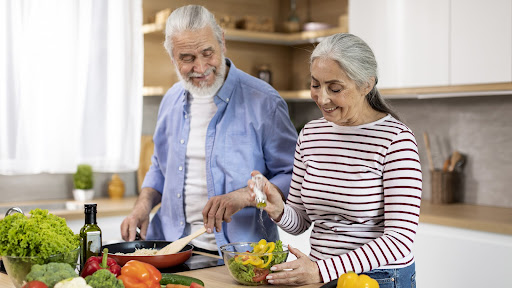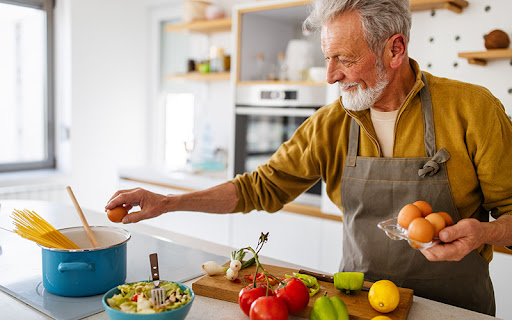One Bedroom Traditional – 700 square feet



When you eat a healthy diet and move your body regularly, you look and feel your best. This is true for adults of all ages, and it’s all the more important for older adults so you can live well and continue to do the activities and hobbies you love.
While you may know what foods to focus on, like eating plenty of protein, dark leafy greens, healthy fats, and citrus fruits, you may need to learn that there are types of foods you should avoid. This helpful list of foods to avoid after 60 will help you with your healthy eating and when it’s better to pass on certain foods.
Eating foods with high sodium can cause health issues like raising your blood pressure and fluid retention – which can lead to leg and foot swelling. High blood pressure can increase your risk of suffering from a heart attack or stroke.
High sodium foods include:
Opting for low-sodium foods or learning to get creative with other herbs and spices can help you create tasty dishes without relying on salt and adding sodium to your diet.
Chicken fingers, french fries, wings, onion rings – all common fried foods that you can find at nearly any restaurant. While they’re definitely tempting, you should know that foods deep fried in oil have high saturated fats and trans fats, which can cause plaque buildup in your arteries.
When fried foods are a standard part of your diet, you may be at increased risk of:
Healthier food preparation alternatives include grilling, roasting, steaming, and boiling.

This may come as a surprise to you! Grapefruit isn’t necessarily unhealthy, but grapefruit juice can interfere with medication for high blood pressure, insomnia, and anxiety. In fact, it can make the effects of the drugs more concentrated.
Be sure to check your medication directions to see if it says to avoid grapefruit. If it doesn’t specify avoiding grapefruit, you can always ask your doctor.
A lot of the foods that you buy on the go or get in the snack aisle are known as empty-calorie foods. They’re processed foods high in sugar, fat, and carbohydrates – but lack nutrients that make you feel full and energized. Eating a diet with a lot of empty-calorie foods can cause unwanted weight gain.
Seek out snacks that are healthy and satisfying, like hummus and veggies or apples and peanut butter.
Even if you avoid caffeinated drinks like coffee, tea, and soda, caffeine is also found in food like chocolate. When you have too much caffeine, it can increase anxiety and affect your sleep, which has its own debilitating effects. The CDC reports that caffeine can disturb your nervous system and your heart.
Opt for decaffeinated teas in the place of coffee or flavored waters in lieu of sodas.
When you’re food shopping, you may find labels that say the item is “sugar-free.” While you may think that this makes that item a healthier choice, that’s not necessarily the case. Foods and drinks that are sugar-free often contain artificial sweeteners that aren’t healthy and can be detrimental to your health.
Artificial sweeteners can cause weight gain, increase your risk of heart disease, and may have a link to increased risk of types of cancers. Watch for these commonly used artificial sweeteners:
Consuming raw or undercooked foods increases the risk of contracting food poisoning. Adults who are 65 and older are more likely to be hospitalized due to food poisoning. This is because as you age, your body may have more difficulty getting rid of toxins, your stomach may not produce enough acid to kill bacteria, and you may have a weakened immune system. You can decrease your risk of food poisoning by avoiding:
The CDC recommends specific preparation, cooking, and storing instructions for all types of food groups so you can take steps to ensure you’re being as safe as possible with the foods you eat.
Ginger Cove is the perfect place to make the most of a healthy and active retirement. With multiple fitness options, social events and activities, and first-class dining that provides fresh, nutritious meals where you and fellow residents give feedback to improve the dining experience, you can lead a lifestyle of wellness in our community. Call 410-670-7793 to learn more or schedule a tour.